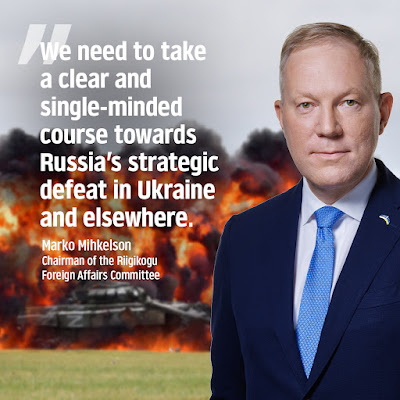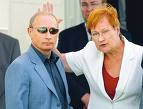Are we ready for World War III?
"Are you ready for war?" This was the question asked from me last August near Bakhmut by the Commander of the legendary 24th Mechanised Brigade and decorated Hero of Ukraine Colonel Ivan Holishevsky.
He knew what he was talking about. His motto as a Brigade Commander is simply “Honour is earned in battle”. In his fight for the freedom of his country he has witnessed the determination of the enemy to destroy everything on its path that it finds alien or resistant. He knows that we must not underestimate Russia because a nuclear country that is waging a great war and has no regard for human lives is a threat to the whole world.
Last week, as we visited New York together with our Nordic and Baltic colleagues, we had the opportunity to meet the real heavyweight of Ukraine’s diplomatic frontline, the UN Ambassador Sergiy Kyslytsya. The diplomat who skilfully deflects Russia’s stone-faced lies on the international political arena and expertly defends his country’s interests remained laconic in his assessment of the events – all of us have already been drawn into a new world war. “We need to acknowledge this and act accordingly,” were his words.
Ambassador Kyslytsya is right. We are already living in the midst of wars that are changing our world. Whether this is World War III, we are not entirely sure yet. But it is the simple truth that the world order where we lived only a couple of years ago will never be restored in that shape again.
Where are we now, what lies ahead of us, and what must we do to avoid the worst?
For starters, the chain of wars that is changing the world order did not start two years ago with Russia’s full-blown invasion of Ukraine. Russia’s war of destruction against Ukraine started in February 2014, that is ten years ago. But even this date does not take us to square one.
If we put aside the fact that Russia has continuously tried to erode the democracy in the Western world since the Bolsheviks came into power and has not abandoned its plans to restore the empire after the collapse of the Soviet Union, the most direct challenge for changing the world order was issued by President Putin in February 2007 in his speech at the Munich security conference. This more or less constituted a 21st century declaration of war against the Western world.
To all intents and purposes, the Kremlin expressed in this speech its readiness and intention to change the world order in a way that would eject the USA from its current leadership position, break up the transatlantic security architecture of the West, and by doing this allow Russia to achieve a long-yearned-for leadership position in defining the security of the continent. All this, and in much stronger terms, was reconfirmed by Putin quite recently, at the meeting of the Valdai Club in early October last year. “The Ukraine crisis is not a territorial conflict and not an attempt to establish regional geopolitical balance. The issue is much broader and more fundamental and is about the principles underlying the new international order,” Putin said in Valdai on 5 October 2023.
But words in Munich have already been followed by actions which is why we are now on the threshold of a massive global catastrophe, or as Putin puts it, of setting up the new international order. The chain of events started with a soft attempt of taking over Estonia in spring 2007, which was followed, to stop NATO enlargement, by the occupation of one fifth of Georgia’s territory, occupation and illegal annexation of the Crimean peninsula, intervention into the civil war in Syria and thus creating a new dominance for Moscow in the Middle East, testing of the reliability of US promises in Syria, deflecting Western allies in Sahel from Mali to Sudan, giving a new spin to the wheel of war by aiding Hamas in its terrorist attacks, attempting a coup in Montenegro, interfering with the Brexit referendum and supporting Catalan independence, interfering with US elections, promoting the waves of immigration in cooperation with international criminal organisations, supporting European extremists under the aegis of protecting traditional values, issuing ultimatums to NATO and the US, and finally, unleashing a massive military force to destroy Ukraine as an independent country.
All this would not be as impressive and successful if Russia did not have China with its even bigger ambitions behind it. President Xi Jinping has not made a secret of the fact that China hopes to change the international status quo by the middle of this century in a way that would give this communist powerhouse free rein once the world order has changed, considering its military and economic might, and increasing or using this as needed.
China is happy with Russia’s actions in releasing the chain of wars for the purpose of destroying the world order under the leadership of the West. In the beginning of February 2022, Putin and Xi affirmed in a joint declaration that “the new inter-State relations between Russia and China are superior to political and military alliances of the Cold War era.” With this, a definite course was taken towards opposition with the USA and the whole Western democratic world. One year later, on 22 March 2023, departing after his two-day visit, President Xi said to the Russian President on the steps of the Kremlin: “Right now there are changes – the likes of which we haven’t seen for 100 years – and we are the ones driving these changes together.”
China, and Russia in its wake with Iran and North Korea guarding the flanks, all have a long-term plan. Their confidence grows from learning that the Western countries are currently lacking options for building up an international common front and thus completely isolating Russia, among other things. Many UN member states, even those who have condemned Russia’s aggression, have remained rather ambivalent and will eventually gravitate towards the side who ends up winning this world-war-scale opposition between authoritarian great powers and democracies.
Together with my colleagues I recently had an excellent opportunity to listen to the head of the intelligence service of a great Western nation discuss the key challenges in the world today. They spoke about the impact of AI, growing global reach of China, continued importance of agent intelligence, and increasing price of intelligence activities. However, their most poignant message was directed at Western decision-makers. They asked directly: Why does our mindset seek solutions from reconciling ourselves to defeat? Why are we missing a strategic vision for a full defence of the Western values and allied space in a decisive response to a power that attempts to change the world order?
The major Western capitals have still not been able to decide once and for all how the war in Ukraine should end and with what results. Estonia has been a great pioneer here. As we are aware of the threat to our very existence, we have known from the beginning that this war would also determine our fate as well. The Minister of Foreign Affairs gave a detailed overview of the things we need to do to help Ukraine to victory in their war of independence. If our bigger allies would also follow Estonia’s lead, Ukraine would have the victory much closer within its reach today. But it is not only about Ukraine. As I have described, Russia is not fighting only for the destruction of Ukraine but the changing of all the principles, standards, and lines of influence that have shaped the whole Western world. This has remained obscure for many because Ukraine, events in Middle East, developments in Sahel, and the potential rise of tensions in Eastern Asia are still seen as separate affairs. And the constantly and publicly expressed fears about escalating the current wars ourselves is just grist for the mill of the enemies of the West.
The recent warnings reverberating around Europe about Russia’s possible attack against NATO hint, on the one hand, to a deficient defence readiness and the need for new defence investments but, on the other hand, these in itself create the perception that there is nothing the West can do to avoid this. For Estonia, the spreading of this narrative and it becoming the received idea is extremely dangerous because this might make the allies used to the idea that submitting to Russia’s ultimatums just might keep their world safe. Moscow receives the impression that the West is reluctant to fight for its interests. We have fuelled this impression together by withdrawing from Afghanistan, Sahel, and now maybe also from the Middle East, but also by providing Ukraine military aid too slowly and acting too cautiously.
The fear to escalate the war with Russia sadly gives the opposite effect. This only makes Russia even more confident and creates a fantasy that it could win the war against the West without spilling too much blood. For Estonia, the most dangerous scenario is the spreading political doubts and strategic indecisiveness among our allies.
This is why it makes complete sense that the main attention of our foreign policy in the near future must be directed into supporting Ukraine, keeping the unity in the allied space that is vital for us, as well as contributing to shaping the broader victory strategy of the West, and putting this to practice.
Instead of passive defence, the Western allies must pull themselves together and set out to actively reinforce their positions and take the initiative on different fronts. Of course, this does not happen overnight and takes infinitely more political will and real defence investments – but what would be the alternative? Do we really want a direct military conflict with Russia?
To avoid this conflict, we need to take a clear and single-minded course towards Russia’s strategic defeat in Ukraine and elsewhere. All the steps that serve this purpose take us closer to restoring peace and avoiding the global war. It goes without saying that constant and unlimited support for Ukraine must be at the heart of it all, to prevent Russia from achieving the goals of its aggression. Ukraine’s victory is a victory of the West in the eyes of many countries, which also makes it much-much easier to achieve success in other visible and invisible fronts or defending the world order which is based on common rules and is so important for us.
At the same time, democracies need to cooperate more actively on the global level and, if possible, our value space needs to be extended consistently. Initiating the process of giving Ukraine an invitation to join at the NATO Washington Summit would be one of such strong signals.
European security architecture must be organised in a way that leaves Russia isolated and deprived of even a minimal influence over the decisions made. Giving in to Russia’s veto at the Annual Session of the Organization for Security and Co-operation in Europe in deciding Estonia’s Chairmanship is a travesty and the Western countries must not allow this to happen again in any shape or form. In fact, what happened actually served to confirm that the OSCE in its present format needs to be dissolved and re-established without Russia’s participation, on new grounds and new principles. Why not use, for example, the French initiative about European political union which could also include the full membership of the United States, Canada, and maybe even other democracies around the world?
We still have the opportunity to prevent a new world war, but it requires overcoming the fear of catastrophe and acting boldly.




Kommentaarid